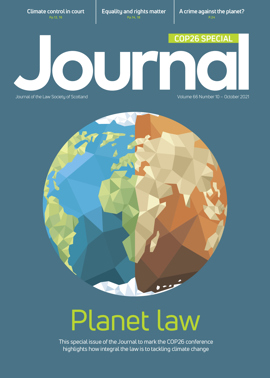Litigation: turning up the heat

Environmental, social and governance (“ESG”) issues, particularly decarbonisation and net zero targets, are already high up board agendas. A recent landmark decision of the Dutch courts in a claim against Royal Dutch Shell has highlighted the growing risk of climate change litigation, a subject increasingly attracting the attention of a wide range of businesses as regulators sharpen their focus on the climate emergency and activists explore a range of tactics.
Actions based on emissions
Climate change litigation has been particularly topical since, in May, the District Court of The Hague ordered Royal Dutch Shell (“RDS”) to reduce the CO2 emissions of the entire Shell group by 45% by 2030, compared to 2019 levels. The decision marks the first time a court anywhere in the world has ordered a company to cut its CO2 emissions. RDS is appealing, but if the ruling is upheld it will have major consequences both in the Netherlands and internationally. Even if the decision does not survive an appeal, success to date will embolden environmental campaigners.
The Dutch court concluded that RDS’s responsibility to reduce CO2 emissions arose from a standard of care set out in the Dutch general tort statute, in particular a section providing protection against acts or omissions which breach a rule of unwritten law relating to proper social conduct. The court decided that, in interpreting this standard of care, it could look to “soft law” instruments endorsing corporate responsibility to respect human rights, such as the UN Guiding Principles on Business and Human Rights. These instruments were said to reflect what is now generally accepted as the required standard of corporate responsibility.
An interesting question is whether a similar conclusion is likely to be reached by our courts. The particular rule of Dutch law is not replicated in English or Scots law. However, both English and Scots law impose a general duty of care, in certain situations, to avoid acts or omissions which cause foreseeable harm to others. Breach of this duty may entitle a claimant to an order requiring particular activities to cease, or to payment of damages for harm caused. The courts also have the power to order performance of a specified act. That could, at least in theory, be the route to an order similar to the one made against RDS.
Based on our current legal framework, a significant degree of judicial innovation would be required for such a claim to succeed. A key battleground will be the need to show that the activities of a particular organisation will cause, or at least materially contribute to, a harmful situation. This is challenging when the number of CO2 emitters, current and historic, is endlessly high. The Dutch court took a flexible approach to this question, stating that RDS had an “individual partial responsibility to contribute to the fight against climate change according to its ability”.
Challenges to project authorisations
Challenges by way of judicial review to approvals of major infrastructure, oil and gas, and other carbon-intensive projects are increasingly common. To date, such challenges have typically been framed in terms of whether the decision-maker has taken sufficient account of the UK’s climate change commitments (an irrationality challenge). These challenges have mainly failed. However, litigation success is not the only objective when activist groups commence judicial review proceedings. Delay, disruption, increased costs and public debate usually follow, even where the challenge is unsuccessful. The increasing likelihood of judicial scrutiny may also put climate change considerations front and centre of the minds of decision-makers.
A notable example of this type of challenge is the litigation over the intended expansion of Heathrow Airport. Last year, the Court of Appeal upheld Friends of the Earth’s challenge to the plans, concluding that the proposed extension was unlawful because the Government’s Airports National Policy Statement did not adequately take into account its commitments in the Paris Agreement to tackle the climate crisis. The Supreme Court overturned this conclusion in December: [2020] UKSC 52. However, the battle is far from over. As the Supreme Court pointed out, when development consent is applied for to construct the runway, it will be necessary to demonstrate, at that stage, that the development will be compatible with the up-to-date (and stricter) climate commitments.
Other examples include Client Earth’s challenge to the Secretary of State’s decision to grant development consent for the construction of two new gas-fired generating units at Drax Power Station, and the Good Law Project’s challenge to the Energy National Policy Statements. Transport Action Network has also recently failed in a challenge to the Government’s Second Road Investment Strategy, although the Government has pledged to review its national network policy to take account of net zero commitments.
This type of activism is clearly on the rise and shows no sign of slowing. Indeed, calls for reforms to improve access to justice in bringing environmental challenges have grown. In August, the UN’s Aarhus Convention Compliance Committee criticised the cost of litigating in Scotland, concluding that it was incompatible with the Convention commitment to provide access to affordable procedures to challenge public decisions on the basis that they fail to respect environmental laws (Report of the Compliance Committee on compliance by the United Kingdom of Great Britain & Northern Ireland – Part I).
Looking forward, we anticipate an increase in recourse to human rights grounds in judicial review challenges. In May, Plan B Earth and three young people filed a petition for judicial review against the Prime Minister, alleging that Government support for coal projects, aviation, oil and gas, and roads investment is contrary to the UK’s climate change commitments and violates rights to life, private and family life and protection from discrimination (guaranteed by articles 2, 8 and 14 of the European Convention on Human Rights, as enacted into UK law by the Human Rights Act 1998).
Greenwashing
Another increasing risk facing businesses across many sectors is greenwashing. Greenwashing is the term used to describe the misstatement of the environmental benefits of products or services, thereby misleading consumers. Allegations of greenwashing have exploded in the last couple of years as manufacturers and advertisers respond to growing consumer interest in environmental factors. “Eco-friendly” and similar claims are now increasingly being scrutinised by consumers, activists and regulators.
The highest profile litigation in this area is the “Dieselgate” emissions claims brought by consumers in various class actions in the UK, US, Germany and Australia against Volkswagen. In Scotland, permission has been granted for litigation involving around 5,000 Volkswagen owners to proceed under the new group proceedings rules.
In the UK, tackling greenwashing is a priority for both the Competition & Markets Authority and the Advertising Standards Agency. The CMA published its Green Claims Code on 20 September 2021, providing businesses with guidance on how to comply with consumer protection law when making environmental claims about products and services. The code sets out core principles for compliance, including that any claims made must be truthful and accurate, clear and unambiguous, and substantiated; must not omit or hide meaningful information; must consider the full life cycle of the product; and only reference fair and meaningful comparisons. Enforcement action by the CMA for breaches of consumer protection law is expected from early 2022.
Climate change is also high on the agenda of the ASA, which has an ongoing Climate Change and the Environment project taking stock of the rules regulating environmental claims. In recent years, the ASA has upheld complaints against environmental claims made by airlines and vehicle manufacturers.
Corporate disclosure litigation
As recognition and understanding of the impact of the climate emergency on corporate performance increases, shareholders globally are turning to litigation to challenge failures to disclose the impact of climate change risk, with the aim of influencing corporate strategy. A claim in Australia brought by a beneficiary of a pension fund prompted a settlement last year in terms of which the fund agreed to incorporate climate change financial risks in its investments and implement a “net zero by 2050” carbon footprint goal. Exxon is currently facing challenges in both New York and Massachusetts that it has failed to make relevant climate-related disclosures.
Litigation is likely to follow in the UK. Existing legislation may provide routes of challenge, such as the duty in terms of s 414 of the Companies Act 2006 to disclose the principal risks and uncertainties facing the company.
However, the focus of UK climate-related disclosure requirements is the recommendations made in the Task Force on Climate-Related Financial Disclosures (“TCFD”). This international initiative provides a reporting framework based on a set of disclosure recommendations for use by companies to provide transparency on their exposure to climate-related risk. Currently, many companies voluntarily comply with the TCFD recommendations.
Mandatory compliance is the next step. The Financial Conduct Authority has introduced a rule that commercial companies with a UK premium listing must disclose, on a comply or explain basis, against the TCFD recommendations for accounting periods beginning on or after 1 January 2021. TCFD-aligned rules are also expected to be introduced imminently by the FCA for asset managers and for workplace pension schemes. The UK Government has announced its intention to make TCFD-aligned disclosures mandatory across the economy by 2025, with a significant proportion of requirements in place by 2023.
Final thoughts
The increasing risk of climate change litigation is a rapidly evolving threat for business and lawyers to grapple with. The extreme nature of the threat of climate change is a disruptive force that requires us all to innovate at pace. It poses a unique challenge to regulators, as well as our courts, as activists increasingly turn to them for solutions. Are we on the cusp of a period of judicial innovation, as we see from the Dutch court in the action against RDS, which will transform the regulatory landscape? We are certainly expecting an increasing number of challenges in the coming years, and it will be fascinating to see how our legal system responds.
Regulars
Perspectives
Features
Briefings
- Criminal court: ID from CCTV
- Criminal court: Justiciary Office briefing
- Licensing: Passport to confusion
- Planning: COVID and NPFD update
- Insolvency: Winding up easier, but hurdles remain
- Tax: Government continues to bring in new taxes
- Immigration: Asylum from the Taliban?
- OPG: Update
- Property: Common parts – a welcome clarification
- In-house: Lawyer with natural energy






